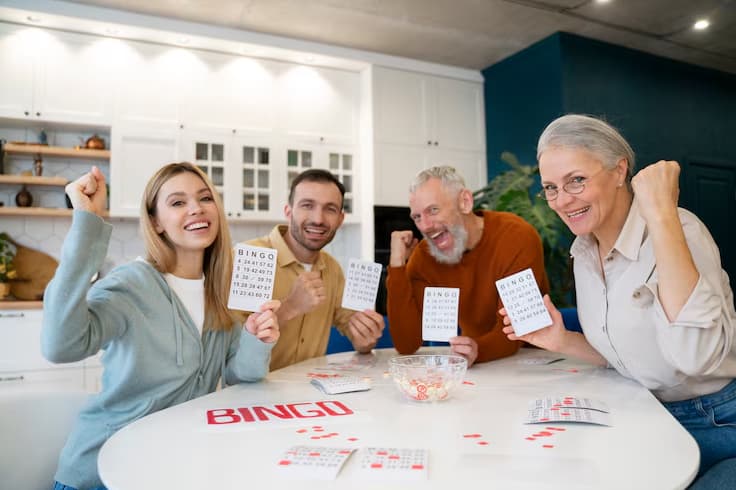Casino games have long been associated with luck, risk, and entertainment. But in recent years, healthcare professionals and researchers have begun to ask a different question: can these games, under the right conditions, offer something more meaningful — something that supports brain health in later life?
In the UK, the number of older adults engaging with digital or land-based casino-style games is steadily increasing. Many are casual players enjoying a familiar pastime. Some interact through mobile games, others through televised bingo, and many participate socially in day centres or during family visits. With the rise of accessible digital games, including those offered by casinos not on Gamstop, older adults now interact with casino-style mechanics more than ever before.
This raises an important conversation: can games like blackjack, poker, roulette, or even digital slot games contribute positively to cognitive health as we age? And if so, how can we use that insight to support older people, particularly those living with early-stage dementia or cognitive impairment?
The Role of Cognitive Stimulation in Ageing
As people grow older, some cognitive changes are expected. Processing speed slows down. Short-term memory becomes less reliable. Tasks that require switching attention or holding multiple things in mind can feel more tiring. But not all mental abilities decline equally.
Skills like language comprehension, emotional reasoning, and long-term memory often remain stable or decline more slowly. More importantly, the brain continues to respond to activity. Mental stimulation, especially when it involves meaningful tasks, can help preserve function and slow decline.
In this context, games that involve focus, choice, and memory become more than entertainment — they become tools. And that’s where casino games enter the discussion.
How Casino Games Engage the Brain
Casino games are rarely described as cognitively demanding, but a closer look reveals multiple areas of mental involvement. Card games like blackjack or poker require attention, counting, memory, and risk judgment. Roulette involves prediction and visual tracking. Even bingo demands pattern recognition, number recall, and sustained focus.

When an older adult plays one of these games, they engage parts of the brain responsible for decision-making, memory retrieval, processing visual information, and managing timing. In group settings, they also interact socially, regulate emotions in response to outcomes, and participate in turn-taking — all of which draw on higher-level cognitive abilities.
These games offer structure. There are rules, goals, and outcomes. For people who may be losing structure in other areas of their lives, that matters. Having a set of clear steps to follow and an outcome to anticipate brings focus and emotional grounding, especially for those navigating confusion or mild disorientation.
What Does the Research Say?
Formal studies examining the link between casino-style games and brain function in older adults remain limited, in part due to the ethical complexity of researching gambling behaviour. However, observational evidence and smaller-scale studies suggest that when these games are used without financial stakes and in controlled ways, they can support mental stimulation and wellbeing.
Some studies have found that older people who regularly play cards show stronger short-term memory and problem-solving skills compared to those who do not. In group care settings, structured bingo sessions have been linked to increased alertness, reduced restlessness, and improved mood. Reports from care homes in the UK and abroad describe how older residents with cognitive impairment respond positively to digital casino-like games when played in moderation.
Importantly, these outcomes are observed not in gambling venues but in environments where games are used as part of cognitive activity plans, often with adapted rules, simplified controls, and no financial incentive. The value lies in participation, not profit.
The Social and Emotional Layer
While cognitive impact is key, the emotional and social benefits of casino-style games should not be underestimated.
Older adults often face shrinking social circles and fewer opportunities for interactive play. Casino games, particularly those that involve cards or community bingo, reintroduce conversation, eye contact, and shared purpose. Even when played digitally, many games now include options for voice chat or visual engagement, helping players maintain a sense of connection.
Emotionally, these games offer a brief shift in focus. Players engage with goals that are immediate, achievable, and enjoyable. That sense of completion — a hand played, a number matched, a token win — can uplift mood and counteract the mental flatness that often accompanies cognitive decline.
In people with early-stage dementia, this combination of mental and emotional engagement can help reduce anxiety, encourage conversation, and bring moments of clarity, even if briefly. Family members often report increased responsiveness after short gaming sessions, particularly when music or familiar visuals are included.
Caution: Risks and Responsibility
Of course, any conversation about casino games and older adults must also address risk. Not all engagement is beneficial. Some older players may develop an unhealthy attachment to the games, especially those that mimic real gambling environments or involve financial stakes.
The greatest risk lies in unmonitored use — for example, when an older person accesses real-money gambling sites on a tablet or mobile device without understanding the terms, stakes, or limitations. Individuals living with cognitive impairment may struggle to recognise the boundaries between play and risk, which can lead to confusion, anxiety, or even financial harm.
For this reason, casino-style games used for cognitive stimulation should be structured, free of financial betting, and ideally part of a broader care or activity plan. Games should be familiar, easy to follow, and include prompts or support from carers or companions.
Adapted versions of games can be particularly effective. For example, card games that reward memory or matching without betting, or bingo games that include personalised clues, sounds, or images instead of numbers. These variations remove risk while keeping the core structure intact — rules, attention, and reward.
Practical Ways to Use Casino Games Safely in Later Life
Families and carers can introduce casino-style games in safe and structured ways. Start with short sessions. Choose games that the person already recognises or played in their younger years — this taps into long-term memory and reduces frustration. Avoid overstimulating visuals or complex interfaces.
It’s also helpful to make games part of a routine. A ten-minute card session after breakfast, or an afternoon of bingo once a week, can be more beneficial than occasional high-intensity play. What matters is consistency and how the person responds, not the speed of the game or whether they “win.”
Care homes can use large-print bingo, card sessions with small groups, or interactive apps designed for older users. Staff can use these games to observe mood, track engagement, and open conversation, especially for residents who struggle to participate in more language-based activities.
For individuals at home, family members can join in — not to supervise, but to share. Sitting at a table with cards, sharing old gambling stories, or even laughing at missed numbers helps build trust, memory, and emotional closeness.
So… Can Casino Games Help?
Yes, they can — but only in the right setting, with the right intention. Casino games alone are not a cure for cognitive decline. But when used thoughtfully, they can:
- Support short-term memory, attention, and decision-making
- Bring routine and structure to the day
- Encourage social connection and reduce isolation
- Provide emotional reward through simple, achievable goals
- Help maintain confidence and a sense of agency
The key is understanding the person, respecting their boundaries, and framing the game as a shared, meaningful activity, not a transaction.
In this way, a well-timed game of blackjack, a friendly bingo round, or even a few spins on a controlled simulation can become something much more: a moment of focus, identity, and joy in a world that often feels confusing or quiet.



